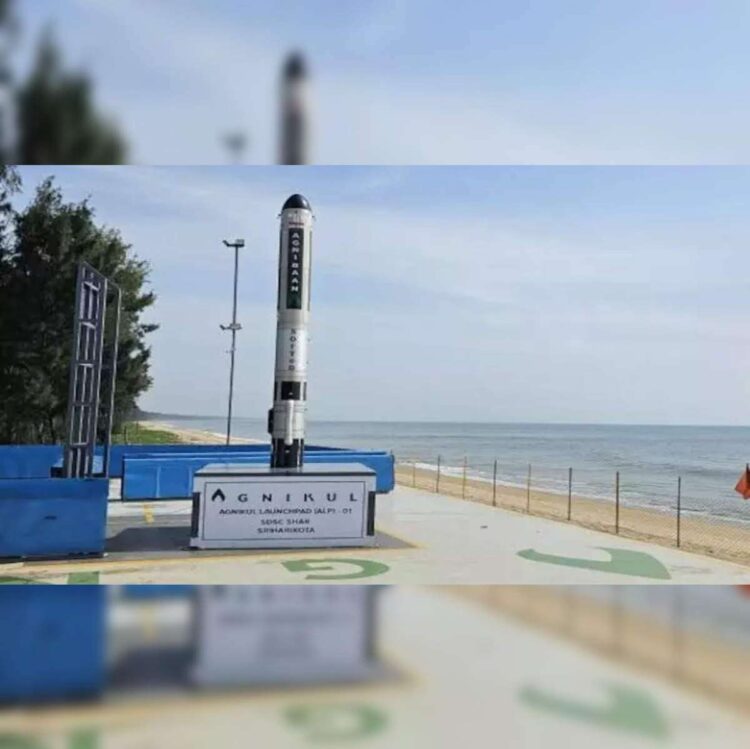Agnikul Cosmos, a private space start-up based in Chennai, successfully test-fired its Agnibaan SOrTeD (Suborbital Tech Demonstrator) rocket today. The launch, powered by a semi-cryogenic engine that the Indian Space Research Organisation (ISRO) is still developing, took place at 7:15 am from the Sriharikota launch pad.
ISRO Chairman Mr. S Somanath confirmed the successful launch to NDTV. “Congratulations @AgnikulCosmos for the successful launch of the Agnibaan SOrTeD-01 mission from their launch pad. A major milestone, as the first-ever controlled flight of a semi-cryogenic liquid engine realized through additive manufacturing,” ISRO posted on X.
Satya R Chakravarty, a professor from IIT Madras and mentor for Agnikul, also confirmed the successful launch. “Humbled to announce the successful completion of our first flight – Mission 01 of Agnibaan SOrTeD – from our own and India’s first & only private Launchpad within SDSC-SHAR at Sriharikota,” Agnikul said in a statement. The statement highlighted the achievement of mission objectives, emphasizing the vehicle’s in-house design and the world’s first single-piece 3D-printed engine.
The launch marked Agnikul’s fifth attempt after four aborted plans due to technical glitches. The team of young engineers demonstrated resilience, overcoming setbacks to achieve this milestone. Founded in 2017 by two aerospace engineers, Agnikul Cosmos aims to innovate in space technology.
The Agnibaan SOrTeD rocket, weighing 575 kg and measuring 6.2 meters, lifted off from Sriharikota and plunged into the Bay of Bengal. Powered by a semi-cryogenic engine using aviation turbine fuel and liquid oxygen, the launch showcases Agnikul’s cutting-edge technology.
ISRO has yet to fly a semi-cryogenic engine, although it successfully conducted a ground test on May 2. Dr. Pawan Goenka, Chairperson of the Indian National Space Promotion and Authorisation Centre (IN-SPACe), praised Agnikul for its innovative approach. “This bold innovation could be a significant differentiator when commercial launches start by India’s start-ups,” he stated.
Srinath Ravichandran, co-founder of Agnikul Cosmos, emphasized the significance of the launch, noting it was India’s first from a private launchpad and featured the world’s first single-piece 3D-printed engine.
Ahead of the launch, Agnikul described the Agnibaan SOrTeD as a single-stage vehicle driven by its patented Agnilet engine, designed for vertical ascent and trajectory validation. The launch from Agnikul’s dedicated launch pad, named Dhanush, represents a significant step in India’s private space sector.
Explaining the advantages of their 3D-printed engine, Moin SPM, co-founder of Agnikul Cosmos, highlighted reduced quality testing time and the use of non-corrosive, commercially available fuels. This innovation facilitates launches from multiple locations with minimal infrastructure.
Agnikul’s launch pad near the sea on Sriharikota island, with a dedicated control room, exemplifies ISRO’s support for private space ventures. The mission was closely monitored, with a self-destruct mechanism in place to ensure safety.
Following the success of Skyroot Aerospace Private Limited’s solid-fueled rocket in 2022, Agnikul aims to provide customizable launch solutions for small satellites. The company has attracted $40 million in investment and employs a youthful, innovative team with an average age of 23.
As global demand for small satellite constellations in low Earth orbit grows, Agnikul Cosmos is poised to become a significant player in the industry, promoting India as a hub for small satellite launches.

















Comments